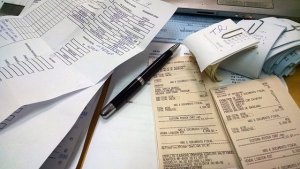Running a small business, especially a startup, takes money. That is a given. So when tax time comes and your accountant presents you with a big bill due to the IRS, it is just one more drain on your capital. However, there is a way for you to pay your taxes without touching the money meant for your business and that is by taking out a small business loan specifically to pay your income tax.
You would think the practice of borrowing money to pay taxes would be frowned upon, but the opposite is true. In fact, financial experts and the IRS itself suggest that business owners take out a small business loan if they don't have the ready cash to pay their taxes. Below are a few legitimate reasons why taking out a loan to pay your business taxes is a good idea from our friends at Fora Financial:
3 Reasons to Use a Business Loan to Pay Taxes
1. Interest Rates
The IRS treats the money you owe them like a loan and charges interest every day that your payment is overdue. Even worse, the interest on a tax debt is compounded daily until your balance is paid off, which means the amount you owe can grow quickly. Due to this, you should pay in full as quickly as possible to avoid expensive interest charges on your remaining balance.
Many alternative lenders offer business loans that can be used to cover your tax liability and at a far lower cost. And unlike interest accrued on an outstanding tax debt, interest on loan payments can sometimes be taken as deductions on your next tax bill.
2. Extra Fees
The Internal Revenue Service will take action if your bill is left unpaid; you’ll incur steep penalties. If you neglect to pay your bill, the IRS will impose an additional fee of half of one percent of your outstanding taxes due for every month that your payment is late. What’s worse, the late payment penalty is on top of accrued interest. To avoid this, apply for a business loan prior to tax season, so that you can avoid paying money in late fees.
3. Avoid Crippling Penalties
As a department of the Federal government, the IRS has the authority to dole out punishments for avoiding payment on your tax bill. The IRS may issue a tax lien, which gives them legal ownership of all your assets, including personal and business property.
A tax lien can have far-reaching implications for your business. It can affect everything from selling your business to obtaining credit. That is because the government will have first dibs on your firm’s assets if you default, which makes lending you money a much bigger risk.
If there is a tax lien on your business, you may not be able to obtain a business loan through a bank. You may, however, be able to borrow from alternative lenders that may be more willing to work with special situations.
Conclusion
If your business doesn’t have the funds to pay its tax bill, there are options other than to default. The nuclear option comes with far-reaching consequences, including damage to personal and business credit. Even if you decide to keep your business running, it may be crippled by the effects of your bankruptcy.
Using a business loan to pay taxes can help you avoid expensive interest payments and penalty fees. It can also prevent your operations from experiencing penal action from the IRS, such as tax liens. Consider seeking a business loan from alternative lenders, which are typically easier to obtain, and place fewer restrictions on how funds can be used.
If taking out a small business loan is looking like an option for you, MoneyThumb would like you to know we have a PDF financial file converter specifically designed for small businesses. This converter will help you get your financials in order for your chosen lender quickly and easily so getting a loan will be a breeze.





















One comment
Albert Write
Hello,
The above information mentions important points and finds it really helpful. We appreciates the information shared.
Thanks for sharing…